Higham Ferrers war hero receives surprise first medal - 70 years after he fought
and live on Freeview channel 276
When Higham Ferrers great-grandfather Richard Jones missed a parcel delivery at home, he had the surprise of his life.
Mr Jones, known as Pryce, hadn't been expecting anything when he opened a mystery package.
Advertisement
Hide AdAdvertisement
Hide AdSo when he looked inside the box he was amazed - as it contained a letter of thanks and a medal from South Korean defence attaché.
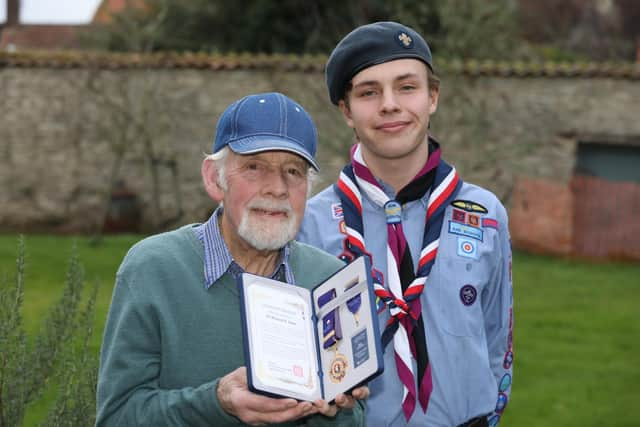

It's the first medal he has received recognising his time spent in the Royal Norfolk Regiment when he was sent to war in 1951, after his call-up for National Service at the age of 18.
The Ambassador for Peace Medal is given to those who served during the Korean War (1950 to 1953) as a show of gratitude towards the brave veterans.
Mr Jones, 89, said: "There was a parcel so we popped down to the post office. I hadn't got a clue what it was. It was a medal - I didn't know anything about it. It came out of the blue, it was a big surprise."
Advertisement
Hide AdAdvertisement
Hide AdAn accompanying letter from Captain Hyungkuk Lee thanked Mr Jones for his service, expressing 'deepest appreciation for the dedication and sacrifice you gave with the Royal Norfolk Regiment in the name of peace and freedom for the people of Korea'.
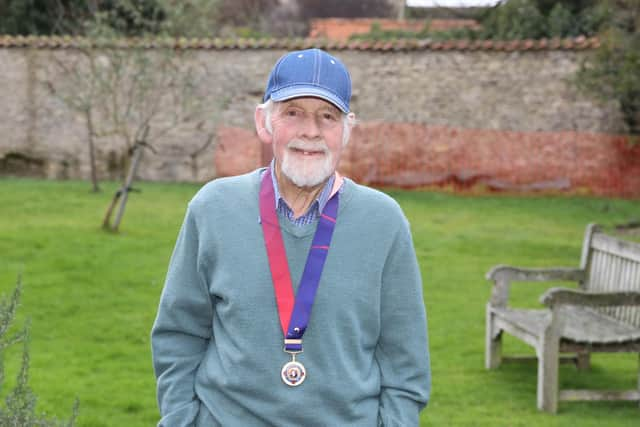

He said: "The Ambassador for Peace Medal is bestowed upon those whom have served during the Korean War and is recognition of the enduring legacy you and your comrades made for the freedom of our people. All Koreans feel immense gratitude toward the brave veterans, who stood by with us in our darkest hour and fought to secure the freedom and prosperity we enjoy today. And by word and by deed we work to honour you and the sacrifices made during the Korean War."
Called up into the infantry to C Company of the Royal Norfolk Regiment Mr Jones, who grew up in Podington, was waved off by his mum and the gathered villagers.
After his six weeks of basic training he was told he would be leaving for the war in Korea and, after ten days leave, he was on a troop ship to Hong Kong - a six week voyage.
Advertisement
Hide AdAdvertisement
Hide AdAfter more intensive marine combat training Mr Jones - a road maintenance worker by trade - headed for the trenches in the mountains where he was based for the rest of the war.
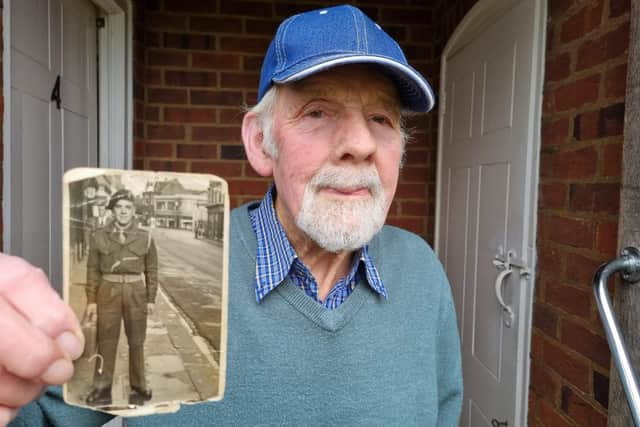

Even when he was hit by shrapnel in his leg, a wound that could have seen him return home, he vowed to return to the frontline and refused to leave his comrades.
He said: "It was freezing in the winter and boiling in the summer. We had the old Second World War equipment - a 303 rifle.
"At Christmas there was a ceasefire and you could hear singing all around the hills. In the night some Chinese troops (fighting against the British troops) came out and attached a sign saying 'Happy Christmas Englishman'. The next day we were tearing into each other again."
Advertisement
Hide AdAdvertisement
Hide AdDespite the hardships of life in the trenches Mr Jones enjoyed the camaraderie. He even featured on a film from the front and was spotted by his mum.
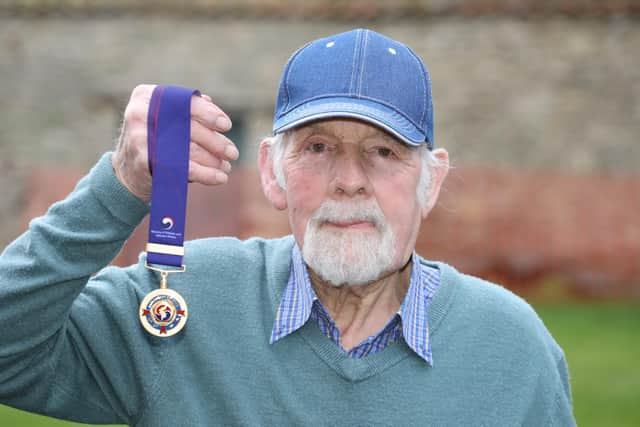

He said: "I didn't mind because I was with my mates. One day Podington WI sent me a big parcel, it was a cake, an iced fruitcake. They said 'Jonesy, what you got there?' My mates helped me finish it off."
In 1953, a long-term ceasefire began and Mr Jones' national service came to an end. Demobbed back to Britain, he arrived back in Rushden on a Birch Bros bus very late at night with his kit bag and started the journey home on foot. As he trudged through Wymington, a local farmer drove past and, recognising the young soldier, stopped and gave him a lift the rest of the way to Podington.
He said: "As we got into Podington he blew his hooter and all the lights in the village came on. My mum came out and gave me a big hug. They had all waved me off and they all waved me back. The song that was playing on the radio as I got back to Britain was We'll Meet Again.
Advertisement
Hide AdAdvertisement
Hide Ad"When I got back I didn't bother about applying for any service medals, I just wanted to get on with my life. They say it was the 'forgotten war'. They made films about Vietnam but not Korea. Later, I did try to get the Peace Medal but I didn't get anywhere."
The surprise was made possible by granddaughter Rhonda O'Connor, 50, who had emailed the Korean embassy to surprise Mr Jones after his attempts had failed.
Now more than seven decades later the 89-year-old's great-grandson Sonny Rising - Rhonda's son - will also be putting on a uniform to follow in his great-grandad's footsteps and making the trip to Korea - but this time for peace.
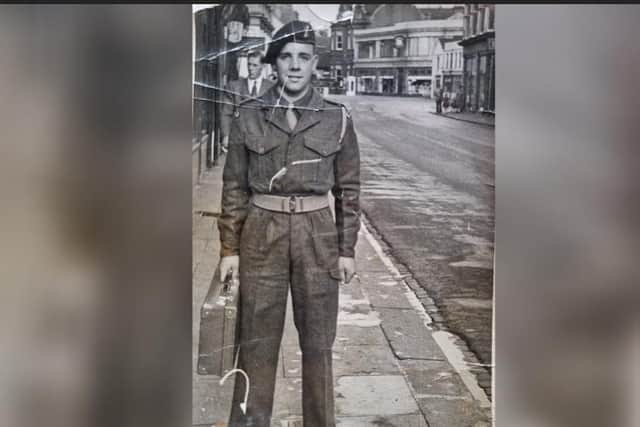

In summer 2023 Sonny, an Explorer Scout with the 1st Sywell Air Scouts, will join more than 40,000 Scouts from all over the world when they gather in Korea for the World Scout Jamboree.
Advertisement
Hide AdAdvertisement
Hide AdThe 15-year-old Sharnbrook Academy student is very proud of his great-grandfather's service and will be visiting the country 70 years after the ceasefire.
He said: "I think it's really impressive that he did that when he was 18. I'm really looking forward to going to see where he served."
A total of 36 scouts from Northamptonshire hope to travel to Korea, with nine from the Wellingborough District and three from the 1st Sywell Air Scouts.
Each scout has to raise £4,000 and Sonny has already started fundraising with plant sales and a sponsored bike ride along the Nene Way is already planned.
Advertisement
Hide AdAdvertisement
Hide AdMr Jones, also a former scout, said: "I wish I was going with him. I would love to go back. I think it's brilliant that he's going. It would be nice to be going with him."
To donate to help Sonny reach his fundraising total click here.To donate to 1st Sywell Air Scout Group's members who will be attending the World Jamboree contact Group Scout Leader Peter Morrall 07971 241243.
The Korean War Information from Royal Norfolk Regimental Museum
Following the Japanese surrender in 1945, Korea was split onto two. The North, called the People’s Republic of Korea, was under Russian influence. The South, the Democratic Republic of Korea, was dominated by America. Fear and suspicion grew between them and in 1950 the North Korean People’s Army crossed the frontiers between North and South: the 38th Parallel.
Advertisement
Hide AdAdvertisement
Hide AdThe war lasted three years. The first year saw rapid movement and changes of fortune, but it was followed by two years of stalemate
The United Nations (UN) Forces, with strong American contingent, fought the North Koreans; initially falling back to the far south and then clawing their way back 300 miles, past the original frontier.
China was neutral but had warned it would help North Korea if the original frontier, the 38th parallel were crossed. China sent an army of 180,000 men, which surprised the UN troops and pushed them back to the south coast. The UN troops, in turn, crept gradually north again using so much heavy weaponry that the advance was given the chilling title ‘the meat grinder’.
By June 1951 the line had once again settled around the 38th parallel. A stalemate, causing many casualties, continued until 1953 when a cease-fire was finally maintained, although no peace agreement was signed.
Advertisement
Hide AdAdvertisement
Hide AdNearly 60,000 British combat troops saw action during the war in Korea, they came from both the regular army and national servicemen. The war saw heavy casualties, 1,100 British soldiers were killed and 37,000 Americans lost their lives. Korean casualties were much higher. Estimates suggest the North alone lost 11 per cent of its population, while 227,000 South Korean troops died and civilian casualties were even higher.
To this day the Korean War has not officially ended, tensions still run high between North and South Korea and US forces remain in the south serving along one of the most heavily militarised borders in the world.
More than 70 years on many veterans of the conflict feel the war in Korea is the ‘forgotten war’ overshadowed by the Second World War and the subsequent events of the Cold War.